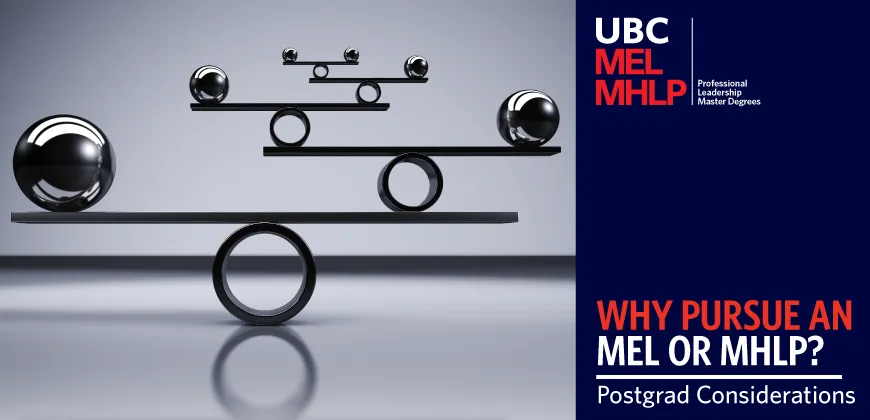Decisions, decisions: The pros and cons of a postgraduate degree

Is going back to school the best strategy for achieving your personal and professional goals? It's a good question. And to answer it, you'll need to ask yourself a few others. What's the best degree for you? Will the investment pay off in terms of increased salary or a position with more responsibility? And are you prepared for the workload?
In our article “Is a postgraduate degree right for you?” we posed these and other questions to help potential students decide if a graduate degree – and the UBC Master of Engineering Leadership (MEL) and UBC Master of Health Leadership & Policy (MHLP) degrees in particular – was the right fit for them. The answers to these questions are not always straightforward. Below, we’ve outlined some of the benefits of a postgraduate degree, as well as some of the things you’ll want to keep in mind as you make your decision.
On the plus side: The credential counts
Having a master’s degree can help you stand out as a job candidate or when putting your name forward for a promotion. In some sectors, such as health care, a master’s degree is often a prerequisite for managerial and leadership positions.
But keep in mind: You need to choose the right degree
The MEL and MHLP are unique degrees, which means they aren’t for everybody! If you’re interested in exploring a particular topic in depth, you may want to choose a more traditional master’s degree, whether that’s a master of engineering or master of nursing. These degrees enable you to develop deep expertise in a specific area of interest. Or perhaps you’ve thought about your professional goals and are more excited by the idea of focusing full-time on business strategy, finance and management. If so, a master of business administration may be your best choice.
The MEL and MHLP offer an interdisciplinary education. They combine the technical education you’d expect from an MEng or MSN with the broader business education of an MBA. That means that while you’re deepening your expertise in your field and acquiring an understanding of the key issues driving change within your industry, you’re also gaining knowledge of business, strategy development and leadership.
Over the course of the year, you’ll develop integrated knowledge of what’s happening in your sector and know where and how you can use your unique skills and knowledge to make a difference. Read more about why today’s leaders benefit from the integrated perspectives you’ll develop in the MEL and MHLP.
On the plus side: It may help you get a higher-paying position
Many of our alumni have used their degree as a springboard into higher-paying positions with more responsibility. A survey of our graduates showed that many were subsequently hired into leadership positions that came with a significant salary increase.
But keep in mind: It’s a big investment
A postgraduate degree is a significant financial investment. Some programs offer part-time options, so depending on your situation you may be able to continue working part-time while going to school. However, you will need to budget carefully to ensure you can cover all of your tuition and living costs during the program while you are not earning your usual salary.
This also points to the value of doing your research ahead of time to understand the career opportunities in your sector and the potential for increased earnings in higher-level positions. Read more about how the MEL and MHLP can help you move your career forward.
On the plus side: You’ll gain expertise
You certainly don’t need to be the number one expert in your field, but expertise counts. If you want to make a difference – whether that’s in energy storage systems or innovations in seniors care – you need significant domain knowledge.
The MEL and MHLP offer a learning environment where you’ll gain a broad overview of your sector while also exploring specific areas in depth. This gives you the knowledge needed to think innovatively and implement solutions. Read more about the value of domain expertise.
But keep in mind: It’s a lot of work
The MEL and MHLP are graduate degrees. You’ll be covering significant amounts of information at a fast pace. With most courses using a flipped classroom format, you are expected to know the material before the class meeting, with class time devoted to problem-solving, discussion and analysis. There will be competing project deadlines and you can expect to give a lot of presentations. You’ll be working on group projects and responsible for delegating tasks and making sure everyone is pulling their weight. There’s a reason that current and past students describe it as an intense – but worthwhile – experience.
Making the most of your degree will also involve stepping outside of your studies to build your network. Connecting with fellow students and professors is just the start. Reaching out to industry leaders, attending in-person or virtual conferences, and participating in optional professional development opportunities all take time – yet all offer the potential for rewarding learning opportunities and making valuable connections. Read more about the power of your peers.
Why pursue a postgraduate degree? This is a topic we’ve written about a lot over the years because we think it’s so important that professionals choose the best graduate program for their specific needs. We encourage you to explore the articles that are part of this series as you evaluate your reasons for going back to school and research the programs that are best suited to helping you reach your personal and professional goals.


